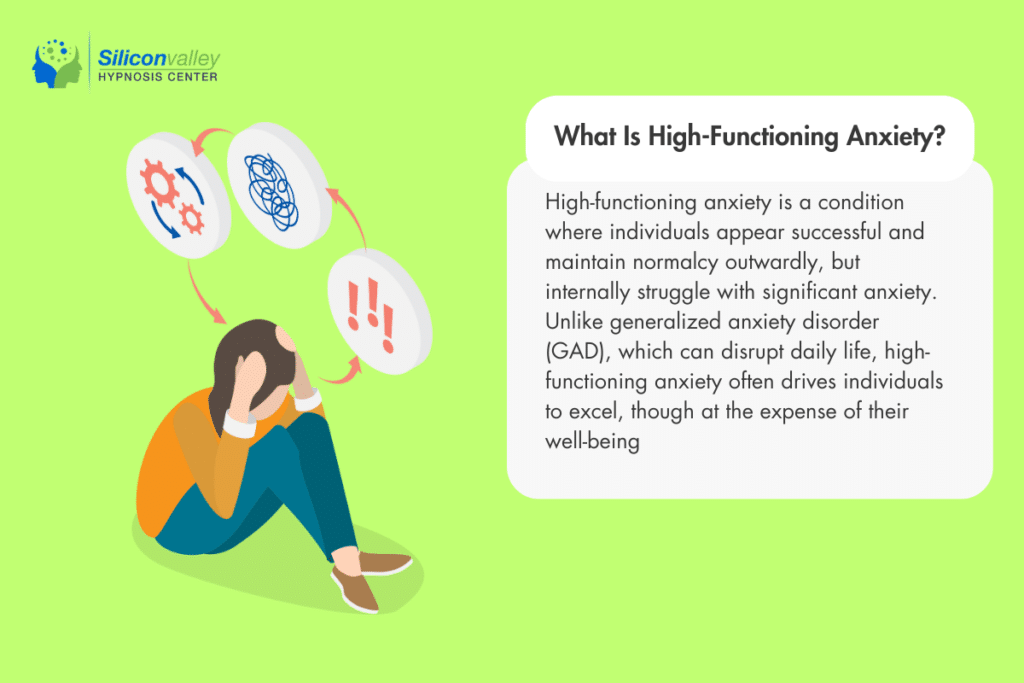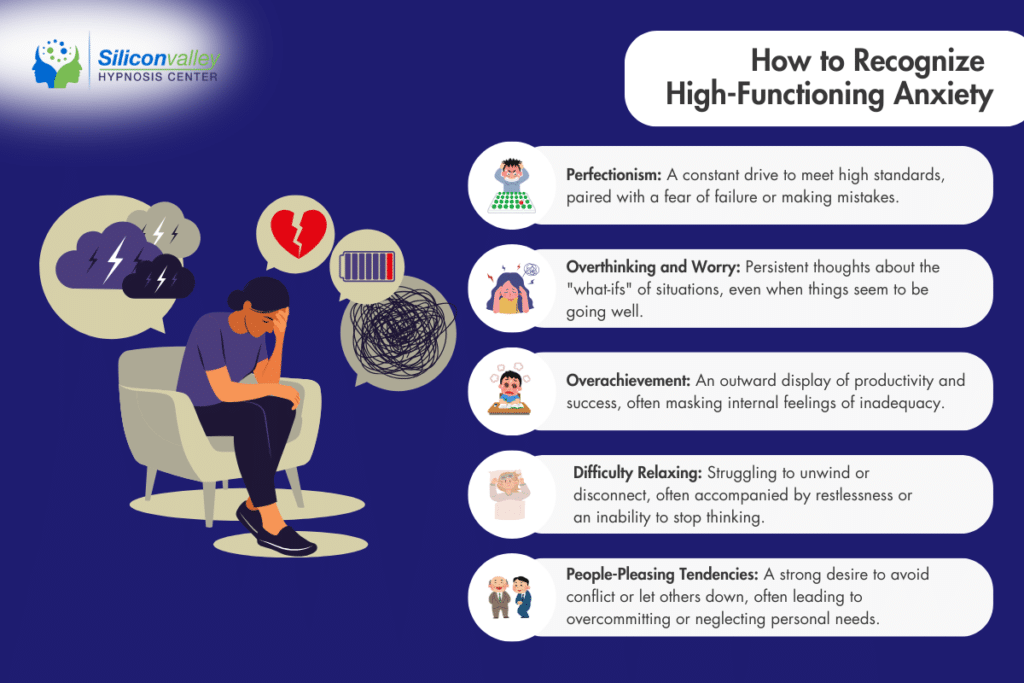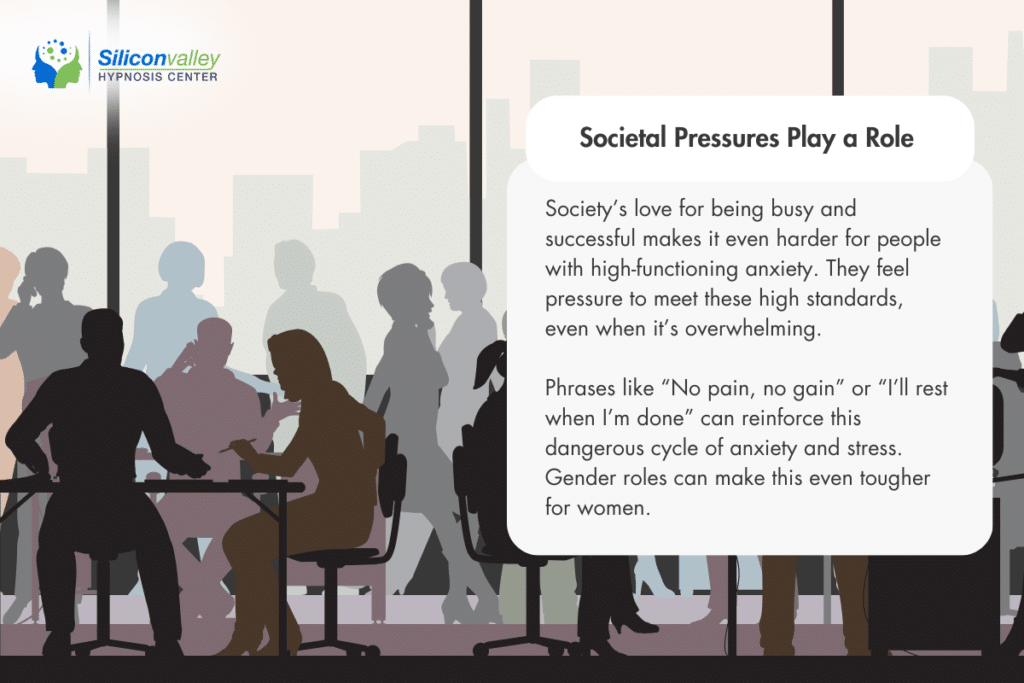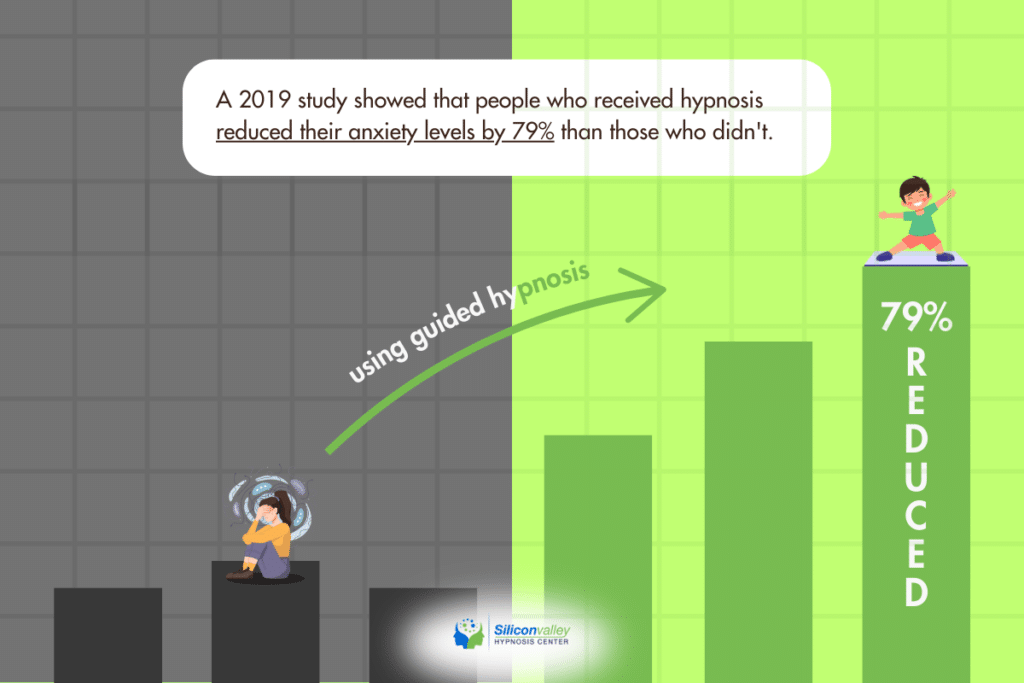On the surface, you seem to have it all together.
- You excel at work…
- Your friends admire your reliability…
- Your family often leans on you during tough times.
But, behind closed doors, there’s another story—a relentless mental strain that keeps you awake at night, knots your stomach, and fills your days with persistent worry.
This is the reality of high-functioning anxiety, a hidden struggle experienced by many.
In this article, we’ll explore high-functioning anxiety, discover its causes, and break down the 13 key signs to help you recognize it and manage it.
What Is High-Functioning Anxiety?
High-functioning anxiety is a type of anxiety condition where individuals manage to maintain outward appearances of normalcy and success, all while experiencing significant internal turmoil.
Unlike generalized anxiety disorder (GAD), which can disrupt daily functioning, high-functioning anxiety drives individuals to excel at their tasks—but often at a personal cost.

How High-Functioning Anxiety Differs from Generalized Anxiety Disorder (GAD)
While both are anxiety disorders, there are the differences between the two:
- Generalized Anxiety Disorder is characterized by persistent worry that directly interferes with a person’s ability to function.
- High-functioning anxiety often pushes people to overachieve, making it easy for others to overlook or misunderstand their struggles.
So, while someone with GAD might avoid stressful situations entirely, a person with high-functioning anxiety may face these situations head-on but at the expense of their physical and mental health.
The Paradox of Appearances
High-functioning anxiety is tricky because it hides behind behaviors we admire, like being:
- Hardworking
- Reliable
- Always on time
These traits often earn people with this type of anxiety praise and recognition, which makes them feel like they need to keep up a “perfect” image, no matter the cost.
For instance, someone with high-functioning anxiety might get awards at work for being super productive. But behind the scenes, they’re staying up all night worrying about tiny mistakes or stressing over what could go wrong.
13 Key Signs of High-Functioning Anxiety
At first glance, high-functioning anxiety might seem like a “good problem to have.”
After all, it drives people to be productive and successful. But the truth is far more complex. This hidden condition can quietly erode:
- Mental health
- Physical well-being
- Overall quality of life
To better understand this condition, let’s break its common symptoms down into three categories: emotional/behavioral, physical, and social signs.
Emotional and Behavioral Signs
Here are the emotional and behavioral signs of high-functioning anxiety:
1. Perfectionism masquerading as excellence
You strive for flawlessness, setting unrealistically high standards for yourself. While this might look like excellence from the outside, it often leads to stress and dissatisfaction.
2. Overthinking and rumination
You replay conversations or scenarios in your head, analyzing every detail to the point of exhaustion. This overthinking prevents you from truly relaxing.
3. Procrastination or overpreparation
Fear of failure can lead to delaying tasks (procrastination) or spending excessive time preparing for them.
4. People-pleasing tendencies
You go out of your way to meet others’ needs, often neglecting your own in the process.
5. Fear of failure despite success
Even with a track record of accomplishments, you constantly worry that you’re not good enough.
Physical Symptoms
Anxiety doesn’t just stay in your head—it affects your body, too.
Constant stress triggers your fight-or-flight response, which increases heart rate and releases stress hormones. Over time, this can lead to physical symptoms like:
6. Chronic Tension: Your muscles, especially in the shoulders, neck, and jaw, feel perpetually tight due to underlying anxiety.
7. Sleep disturbances: Falling asleep can be challenging, and you often wake up feeling unrested, even after hours in bed.
8. Digestive issues: Anxiety can cause gastrointestinal problems like nausea, bloating, or irritable bowel syndrome.
9. Restlessness or fidgeting: Sitting still feels impossible, as your mind and body are always on edge.
10. Racing heart or shortness of breath: These physical symptoms often strike during moments of perceived calm, reminding you of your constant state of stress.
Social Signs
High-functioning anxiety can also harm your social life.
Many people with this form of anxiety find it hard to relax around others or be vulnerable in relationships. Some common struggles include:
11. Social withdrawal: You avoid gatherings, not because you dislike people, but because you fear judgment or feel emotionally exhausted.
12. Difficulty saying “No”: You overcommit to avoid disappointing others, even when it negatively affects your well-being.
13. Superficial relationships: Deep connections are difficult, as vulnerability feels too risky.
How to Recognize High-Functioning Anxiety
High-functioning anxiety often blends into daily life, making it hard to recognize even when signs are present. Here’s how to spot it:

In Your Personal Life
You might struggle to relax, even during leisure time, as your mind constantly races with worries or plans. This can make it hard to fully enjoy hobbies, vacations, or downtime with family. Even in close relationships, you may feel disconnected, either because:
- You’re preoccupied with anxious thoughts
- You’re afraid to share your struggles.
Over time, this can create emotional distance, leaving you feeling isolated despite being surrounded by loved ones.
In Professional Settings
At work, high-functioning anxiety can show up as workaholic tendencies or an obsessive need to over-deliver on tasks. While this might earn praise from colleagues or supervisors, it’s often fueled by a fear of criticism or a deep-seated need to avoid failure.
You might find yourself constantly taking on more responsibilities, not because you want to, but because saying “no” feels like letting others down.
This constant pressure to prove your worth can lead to burnout, even as you outwardly appear to excel.
Why These Signs Often Go Unnoticed
The signs of high-functioning anxiety often go unnoticed because of the following reasons:
It’s Often Overlooked or Misunderstood
One of the biggest problems with high-functioning anxiety is that it’s hard to notice from the outside. Unlike other anxiety disorders, where someone might visibly struggle, people with high-functioning anxiety look like they’re managing just fine.
They might think, “I’m not anxious enough to need help,” while others might assume they’re simply hardworking or detail-oriented.
This lack of awareness means many people don’t get the support they need from mental health professionals or loved ones.
Societal Pressures Play a Role
Society’s love for being busy and successful makes it even harder for people with high-functioning anxiety. They feel pressure to meet these high standards, even when it’s overwhelming.
Phrases like “No pain, no gain” or “I’ll rest when I’m done” can reinforce this dangerous cycle of anxiety and stress. Gender roles can make this even tougher for women.
Many feel like they need to “do it all”—excel at work, keep their home life perfect, and never let their stress show. This creates even more pressure to hide their struggles and keep pushing through.

Can Hypnotherapy Help?
High-functioning anxiety can feel overwhelming, but hypnotherapy can offer an effective and personalized way to address its root causes.
Unlike traditional talk therapy, hypnotherapy dives into the subconscious mind, uncovering thought patterns and behaviors driving the anxious feelings and physical symptoms. Here’s how it works and why it’s worth considering:
Uncovering Subconscious Patterns
Hypnotherapy helps people with anxiety explore the hidden thoughts and beliefs fueling their condition. For instance, someone with high-functioning anxiety might have a subconscious fear of failure or feel they must always be perfect to be accepted.
These underlying beliefs can lead to
- Overthinking
- Excessive worry
- Physical manifestations like chronic tension or gastrointestinal issues.
During hypnotherapy sessions, an experienced therapist uses guided relaxation techniques to access these deeper thoughts. This creates a safe space for exploring why these patterns exist and helps you develop healthier ways to respond.
Breaking the Cycle of Anxiety
One of the biggest challenges of high-functioning anxiety is the perpetual cycle of stress and coping. For instance, constant worry might push a person to overwork or prepare excessively for social situations.
While these behaviors can bring temporary relief, they often reinforce the anxiety over time.
Hypnotherapy interrupts this cycle by reframing negative thought patterns and replacing them with positive, calming affirmations. This process can:
- Reduce the intensity of anxious feelings
- Lower stress levels
- Improve daily functioning
Building Resilience
Hypnotherapy doesn’t just address anxiety symptoms—it also equips people with strategies to build resilience.
Techniques like visualization, deep breathing exercises, and mindfulness training are often introduced during sessions. These tools help you manage stressful situations more effectively and maintain a sense of calm in your daily lives.
For example, if you’re struggling with shortness of breath or a racing heart during a presentation, you might learn how to use visualization to calm your mind. Over time, these techniques can enhance your ability to face challenges without feeling overwhelmed.
Evidence-Based Results
Research supports the benefits of hypnotherapy for anxiety.
Studies show that guided hypnosis can significantly reduce symptoms of anxiety disorders, including generalized anxiety and social anxiety.
A 2019 study showed that people who received hypnosis reduced their anxiety levels by 79% compared to those who didn’t. In one study, participants reported noticeable improvements in both their mental and physical health after just a few sessions.

At Silicon Valley Hypnosis Center, we have helped many individuals suffering from anxiety to find relief, including high-functioning anxiety.
Like Maira said, “I suffered from anxiety, panic attacks, and PTSD. After my first session, I walked out of this room feeling like a new person.”
Break Free From High-Functioning Anxiety with Hypnosis
High-functioning anxiety may be hidden, but it doesn’t have to define your life. Recognizing the signs is the first step toward reclaiming your peace of mind.
Hypnotherapy takes it a step further by addressing the root causes of your anxiety and teaching practical coping strategies to improve your quality of life.
Ready to take the next step?
Schedule a free consultation today to discover how we can help you thrive in your personal and professional life anxiety-free.